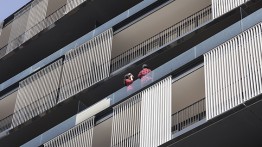The Ornamental Metal Institute of New York Lecture | Farshid Moussavi: Architecture and Micropolitics
Friday, October 18, 2024, 6:30 - 8:30pm

Image Credits: Farshid Moussavi, La Defense, Nanterre Residential Building. Photography by Stephen Gill.
This event will be conducted in-person in The Great Hall and through Zoom.
For in-person attendance, please register in advance here.
For Zoom attendance, please register here.
Architecture and Micropolitics seeks to dispel two widely held misconceptions: first, that architects are no longer central to the making of buildings and, second, that design is a linear process which begins with a fully formed architectural vision. Architect Farshid Moussavi argues that the temporality of architecture provides day-to-day practice with the potential to generate change. She proposes that we abandon determinism and embrace chance events and the subjective factors that influence practice in order to ground buildings in the micropolitics of everyday life.
The lecture will be followed by a Q&A moderated by Michael Young.
Farshid Moussavi OBE RA is an internationally acclaimed architect, writer and educator. She is founder and principal of the practice Farshid Moussavi Architecture (FMA), which is responsible for award-winning projects around the world including the Museum of Contemporary Art in Cleveland, USA. Her largest project to-date, the Ismaili Center Houston in Texas, is due for completion in 2025. Moussavi’s ideas and work are at the forefront of critical debate about architecture. Author of four books, her most recent, Architecture and Micropolitics (Park Books, 2022), sets out her vision for architecture as a form practice that is responsive rather than deterministic. Moussavi has pursued teaching in parallel to practice for more than 30 years, seeing it as the opportunity for developing critical thinking on subjects including the design of social housing and approaches to adaptive reuse. She is currently Professor in Practice of Architecture at Harvard University Graduate School of Design.
This event is free and open to the public.
Located in The Great Hall, in the Foundation Building, 7 East 7th Street, between Third and Fourth Avenues




